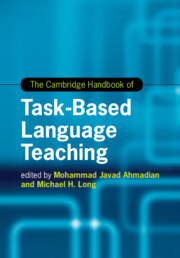Book contents
- The Cambridge Handbook of Task-Based Language Teaching
- Cambridge Handbooks In Language And Linguistics
- The Cambridge Handbook of Task-Based Language Teaching
- Copyright page
- Dedication
- Contents
- Figures
- Tables
- Contributors
- Preface The Origins and Growth of Task-Based Language Teaching
- Part I The Rationale for Task-Based Language Teaching
- Part II Tasks and Needs Analysis
- 3 Why Task? Task as a Unit of Analysis for Language Education
- 4 Adapting and Advancing Task-Based Needs Analysis Methodology across Diverse Language Learning Contexts
- 4A Developing a Task-Based Approach
- 4B A Task-Based Language Needs Analysis of Syrian Refugee Parents in Turkey
- 4C Task-Based Language Teaching in a Japanese University
- 4D The Implementation of a Task-Based Spanish-Language Program in Qingdao, China
- 5 The L in TBLT
- 5A Blustery with an Occasional Downpour
- 5B “I Have a Question”
- Part III The Task Syllabus and Materials
- Part IV Methodology and Pedagogy
- Part V Task-Based Language Teaching with School-Age Children
- Part VI The Teacher in Task-Based Language Teaching
- Part VII Task-Based Assessment and Program Evaluation
- Part VIII Research Needs and Future Prospects
- Index
- References
5A - Blustery with an Occasional Downpour
An Analysis of Target Discourse in Media Weather Forecasts
from Part II - Tasks and Needs Analysis
Published online by Cambridge University Press: 19 November 2021
- The Cambridge Handbook of Task-Based Language Teaching
- Cambridge Handbooks In Language And Linguistics
- The Cambridge Handbook of Task-Based Language Teaching
- Copyright page
- Dedication
- Contents
- Figures
- Tables
- Contributors
- Preface The Origins and Growth of Task-Based Language Teaching
- Part I The Rationale for Task-Based Language Teaching
- Part II Tasks and Needs Analysis
- 3 Why Task? Task as a Unit of Analysis for Language Education
- 4 Adapting and Advancing Task-Based Needs Analysis Methodology across Diverse Language Learning Contexts
- 4A Developing a Task-Based Approach
- 4B A Task-Based Language Needs Analysis of Syrian Refugee Parents in Turkey
- 4C Task-Based Language Teaching in a Japanese University
- 4D The Implementation of a Task-Based Spanish-Language Program in Qingdao, China
- 5 The L in TBLT
- 5A Blustery with an Occasional Downpour
- 5B “I Have a Question”
- Part III The Task Syllabus and Materials
- Part IV Methodology and Pedagogy
- Part V Task-Based Language Teaching with School-Age Children
- Part VI The Teacher in Task-Based Language Teaching
- Part VII Task-Based Assessment and Program Evaluation
- Part VIII Research Needs and Future Prospects
- Index
- References
Summary
This case study is an analysis of target discourse to collect and analyze discourse samples of radio and television forecasts. We focused on three aspects of an analysis of target discourse: (a) identifying recurrent subtasks to understand the internal structure of weather forecast discourse, (b) analyzing linguistic features that frequently co-occur with the subtasks (i.e., structural ellipsis and technical and sub-technical vocabulary), and (c) developing samples of prototypical discourse that can be put to use in task-based materials. Our intention in this chapter is to be as descriptive and transparent as possible in reporting methods and procedures of analysis, so interested researchers and practitioners can refer to this study when conducting their own analysis of target discourse studies.
Keywords
Information
- Type
- Chapter
- Information
- The Cambridge Handbook of Task-Based Language Teaching , pp. 173 - 187Publisher: Cambridge University PressPrint publication year: 2021
